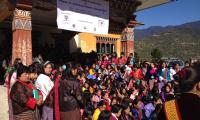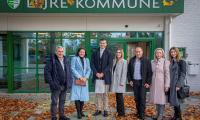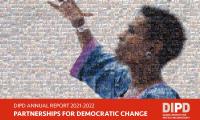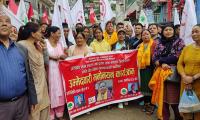Bhutan’s path towards democracy
DIPD is finalising its partnerships in Bhutan, which since 2011 has contributed to the inclusion of women in politics and stronger dialogue between the political parties in the country.

Bhutan is a constitutional monarchy, but in 2008 the Bhutanese king introduced the notion of democracy and parliamentarism to the citizens of the country. Several elections have been held since, while the king still maintains the overall political power and right of veto.
The introduction of a more democratic system in the country is still new but the population has shown great appetite in a new governing system.
DIPD has, in partnership with the Danish party Green Left and national organisations, supported the development of a sustainable, democratic culture. The partnerships have worked to support the representation of women in politics and to strengthen the cross political dialogue.
Training of female politicians
Through financial support women's participation, representation, and political leadership has been strengthened. Results show that the population now have a more positive perception and acceptance of women's participation in politics in Bhutan.
DIPD’s partner Bhutan Democracy Dialogue (BDD) has created a foundation for an inclusive political culture through trainings of young female politicians and potential candidates. The training has focused on party organisation and policy development.
The Danish political party, Green Left, have shared their experiences and contributed to training regarding women's political participation and coalition building. In addition to strengthening the participants' skills, the trainings have also created a solid network among the women participating.
Skilled, political engaged women are role models
Women in politics are now viewed differently in Bhutan and they are better represented in politics. DIPD’s partner Bhutan Network Empowering Women (BNEW) and their work has been instrumental in this change and the positive results in better representation of women in politics.
BNEW has been the main facilitator of cross-political cooperation between women in parliament, which has helped enhance the confidence in women’s leadership by increasing the number of visible role models and competent elected women leaders.
Over the years, BNEW has trained and increased the opportunity for 7,000 women to participate in the political system. In the local elections in 2011, 166 female candidates took part. In the local elections in 2016, the number had increased to 579 female candidates. Women now make up 15.7 percent of the parliament, and most of these women have participated in the trainings from BNEW.
Dialogue as a tool for democracy progress
The democratic dialogue in the country has also been strengthened through the DIPD partnerships. The Bhutan Center for Media and Democracy (BCMD) has initiated and held annual Democracy Forums, which have contributed to a better understanding of democracy and democratic elections – among politicians and the population in general.
The Democracy Forums have given the political parties the opportunity to engage in dialogues, discuss election processes and thereby reduce political conflicts across parties.
BCMD has also published manuals and the dialogues were aired on national news channels, so that a larger part of population could benefit from the discussions and gain a better understanding of what a democratic culture is all about.
Gratitude to the Bhutanese partners
With a new strategy adopted by the board of DIPD with a focus on the engagement of the Danish political parties the DIPD's partnerships in Bhutan has come to an end.
“We would like to thank our partners in Bhutan for their great work and perseverance in creating a better democratic future for the Bhutanese people. I am confident, that our partner organisations will continue to support and strengthen the work towards a stronger inclusion of women in politics in Bhutan,” says Executive Director of DIPD, Lisbeth Pilegaard.
DIPD will continue to follow the country's development, the activities of the former partner organisations and their results. DIPD will also share the gained experiences and networks with other organisations and actors working with and in Bhutan, such as Danish Parliament’s international department.



